#chariot burial
Photo
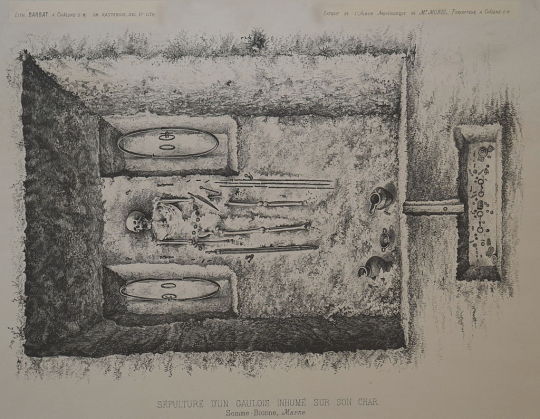

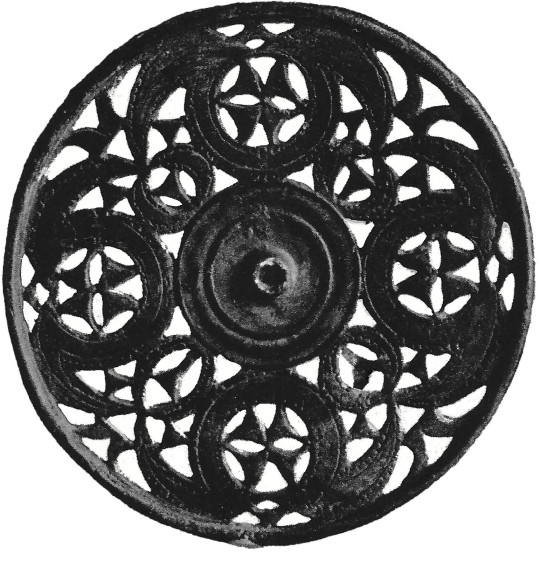

Somme Bionne, early La Tene male chariot burial
my personal favourite - fragment of horse gear with swirling swastikas
#archaeology#swastika#iron age#chariot burial#prehistory#celts#horse gear#funerary rites#prehistoric europe#La Tène period#princely tomb#artefact#my upl
5 notes
·
View notes
Text
#wetwang#no not the one in middle-earth the one in yorkshire#known for its Iron Age chariot burial cemetery at Wetwang Slack
5 notes
·
View notes
Text
The Battle of Manhattan didn’t go the way the Fandom thinks it did; we need to address the “massacre” of the Titan Army!
The Battle of Manhattan is the most pivotal event of the first series. And we see the entire thing exclusively from Percy’s point of view. He takes us through the thickest of the fight from one end of Manhattan Island to the next, and shows us a desperate fight of good against evil.
But we have another point of view for the battle, one that comes from the demigods of the Titan army, and one that informs us of a far different, darker side to the conflict. One where an entire army of children is massacred by the victorious Olympians, without a thought or even a care. It’s a shocking, confronting side of the struggle that most fans don’t seem to be aware of.
But it’s also completely inaccurate.
Now I love Alabaster; he’s one of my favorite characters, and I want nothing but the best for him. But he’s a demonstrably unreliable narrator. I don’t even mean that he’s intentionally dishonest; but he’s very badly misinformed about what actually happened. And that gives the fandom three major misconceptions that need to be cleared up.
Alabaster gets the casualty ratio for the battle wrong (the Olympians had more than he thinks).
The Titan army has far fewer demigods than most fans think (not much more than 50 at the most).
Alabaster does say that there was a “massacre” at the end of the battle, but most of the TA demigods had deserted before that!
Part 1) The Olympians Have High Casualties
“It was a massacre. If I remember right, my mother told me that Camp Half-Blood and its allies had sixteen casualties total. We had hundreds.” (pg 219)
This is the only time we get a specific number for Olympian casualties, but it just doesn’t match up with what actually happens in the books. Looking back at all the deaths we do see:
Charlie Beckendorf -1
one [Hellhound] got hold of an Apollo camper and dragged him away. I didn’t see what happened to him next. I didn’t want to know. (pg 182) -1
Michael Yew -1
A young dragon had appeared in Harlem, and a dozen wood nymphs died before the monster was finally defeated. (pg 203) -12
“We lost twenty satyrs against some giants at Fort Washington,” [Grover] said, his voice trembling. (pg 203) -20
Giants smashed through trees, and naiads faded as their life sources were destroyed. (pg 243) -1<
Enemy archers returned fire, and a Hunter fell from a high branch. (pg 244) -1
Too many of our friends lay wounded in the streets. Too many were missing. (pg 257) -1<
The flagpoles were hung with horrible trophies –helmets and armor pieces from defeated campers. (pg 282) -1<
The Drakon lashed out, swallowing three californian centaurs in one gulp before I could even get close. (pg 288) -3
Poison spewed everywhere, melting centaurs into dust along with quite a few monsters, (pg 288) -1<
The Drakon snapped up one Ares camper in a gulp. (pg 291) -1
Silena Beauregard -1
Leneus -1
a body covered in the golden burial shroud of Apollo’s cabin. I didn’t know who was underneath. I don't want to find out. (pg 303) -1
Oddly enough, we actually miss the moment that was probably the worst for the Olympians, the final push by Kronos that breaks through their line. After Clarisse slays the drakon and the monsters are driven back again, Percy and co. take the opportunity to go up to Olympus. Percy gives Pandora’s Pithos to Hestia, and then contacts Poseidon via his throne. It’s just as he finishes that Thalia comes up and tells them that Kronos is coming again, but they miss the fighting.
By the time we got to the street, it was too late. Campers and Hunters lay wounded on the ground. Clarisse must have lost a fight with a Hyperborean giant, because she and her chariot were frozen in a block of ice. The centaurs were nowhere to be seen. Either they’d panicked and ran, or they’d been disintegrated. (pg 312) -<500
And finally, Kronos does kill some people on Olympus itself.
A few minor gods and nature spirits had tried to stop Kronos. What remained of them was strewn about the road: shattered armor, ripped clothing, swords and spears broken in half. (pg 322) -1<
The specific deaths we have mentioned during the battle amount to 48 at the very least; and that is an extremely conservative estimate that only includes the deaths Percy has the time and presence of mind to witness in all the carnage. Considering how many others must have happened, factoring the sudden disappearance of the 500 centaurs in particular, it was likely in the hundreds. And most of the centaurs probably ran at the end, but even that would have involved heavy casualties.
It’s true that actual demigods were a smaller fraction of Olympian forces, and so would have made up just a fraction of losses. The number 16 might actually make sense if it were just the number of campers lost, but that’s not what Hecate said, she said total.
It might be significant that Hecate is the actual source of this misinformation. Would she have reason to lie to her own son, or might she herself be out of the loop. Right now, we just can’t know.
And she might be underestimating Titan Army losses too. Considering how many times a wave of several hundred monsters tear into Manhattan, and get thrown back by the Olympians only to return later with no discernable drop in numbers, until the army is finally routed entirely, it wouldn’t surprise me if the TA actually took a thousand or more casualties. But those would be overwhelmingly monsters, because:
Part 2) Less Than Fifty Demigods Were Even In The Titan Army
To prove that there could not possibly have been hundreds of TA demigods killed at Manhattan, we need look no farther than Alabaster's own account.
“There was a war between the gods and titans last summer and most half-bloods–demigods like me–fought for the Olympians.” (pg 218)
So the TA could not have had more demigods than the Olympians; and they had about a hundred. There are forty campers to start with, who are quickly joined by the Hunters, who now have thirty members. Then, in the last hours of the fight, they are finally joined by the Ares cabin, which brings another thirty (jeez Ares, you animal!). So Olympus has an even hundred demigods. (The Hunters aren’t necessarily all demigods by birth, but I don’t think Alabaster would make a distinction based on that.)
So the TA has less than a hundred demigods, significantly less. I would argue they probably had no more than fifty because that lines up with the only solid numbers we ever get for them. And every time the TA is described, demigods are a clear minority. First, look at the foes Percy encounters when he infiltrates the Princess Andromeda:
I saw monsters patrolling the upper decks of the ship–dracaenae snake-women, hellhounds, giants, and the humanoid seal-demons known as telkhines . . . . . “I don’t care what your nose says!” snarled a half-human half-dog voice—a telkhine. “The last time you smelled half-blood, it turned out to be a meatloaf sandwich!” “Meatloaf sandwiches are good!” a second voice snarled . . . . . a telkhine was hunched over a console . . . . . a half dozen telkhines were tromping down the stairs . . . . . past another telkhine . . . . . And in the fountain squatted a giant crab . . . . . a couple of dracaenae slithered across my path . . . . . As I was running up the stairwell, a kid charged down . . . . . Laistrygonian giants filed in on either side of the swimming pool . . . . . demigod archers appeared on the roof . . . . . two hellhounds leapt down . . . . . The crowed of monsters parted . . . . . Giants jeered. Dracaenae hissed with laughter . . . . . throwing monsters off their feet . . . . .I knew him, of course: Ethan Nakamura . . . . . two giants lumbered forward . . . . . Panicked monsters surged backward . . . . . one of the dracaenae hissed . . . . . I pushed through a crowd of monsters . . . . . Monsters yelled at me from above.
That was a quick summary of all the enemies Percy and Charlie encounter on the Princess Andromeda, I’m not crazy enough to try and write the whole chapter. But it’s pretty clear there are only a few demigods amid dozens of monsters. We hear the same thing from Poseidon later, that “there were only a few demigod warriors aboard that ship”; we might question whether or not Poseidon is a trustworthy source, but the evidence does back him up.
When we finally get to the battle, the disparity of demigod numbers in the TA is again evident:
The bronze image showed Long Island Sound near La Guardia. A fleet of a dozen speed boats raced through the dark water toward Manhattan. Each boat was packed with demigods in full Greek armor. At the back of the lead boat, a purple banner emblazoned with a black scythe flapped in the night wind. I’d never seen that design before, but it wasn’t hard to figure out: the battle flag of Kronos.
“Scan the perimeter of the island,” I said. “Quick.”
Annabeth shifted the scene south to the harbor. A Staten Island Ferry was plowing through the waves near Ellis Island. The deck was crowded with dracaenae and a whole pack of hellhounds. Swimming in front of the ship was a pod of marine mammals. At first I thought they were dolphins. Then I saw their doglike faces and swords strapped to their waists, and I realized they were telkhines—sea demons.
The scene shifted again: the Jersey shore, right at the entrance of the Lincoln Tunnel. A hundred assorted monsters were marching past the lanes of stopped traffic: giants with clubs, rogue Cyclopes, a few fire-spitting dragons, and just to rub it in, a World War II-era Sherman tank, pushing cars out of the way as it rumbled into the tunnel. (pg 167)
Here we see the first wave of the Titan Army as a three pronged attack (which Percy says on the next page collectively numbered at least 300) and only one of the units has demigods. It’s the one that Kronos leads, so it’s probably meant to be a more elite unit, at least at first.
We don’t know for sure how many there are. Speedboats are usually made to carry 4-6 people so a dozen would be possible 48 to 72. Considering Alabaster says there were significantly less demigods in the TA than the Olympians, I would guess it’s on the lower end; and that does match another number we see in a moment.
This fleet never reaches Manhattan, since Percy bribes the East River to swamp their boats. Those who say many TA demigods were killed in the battle might point to this as Percy causing a bunch of kids to drown; but Alabaster never mentions a mass drowning in his narrative of the battle, and he would have been on one of those boats, so it’s safe to say they just went for a swim.
(And Kronos was with them, which means that a very angry titan lord was suddenly pitched into the river and had to swim with the rest of them. That’s not really relevant, I just want everyone to know that.)
Percy is then immediately told that “Another army is marching over the Williamsburg bridge.” This fourth prong of the attack, led by the Minotaur, also has no demigods in it.
An entire phalanx of dracaenae marched in the lead . . . About a hundred more monsters marched behind them. (pg 182)
More monsters surged forward —snakes and giants and telkines—but the Minotaur roared at them, and they backed off. (pg 186)
But more monsters keep advancing because by the time Percy kills the minotaur and the demigods charge and rout the whole group, it had grown to 200
Finally, the monsters turned and fled—about twenty left alive out of two hundred. (pg 188)
So the grand total for the first TA attack was 500 soldiers or more, with only 40-70 of them demigods. And after the monsters on the Williamsburg bridge retreat, those demigods show back up.
Then I saw the crowd at the base of the bridge. The retreating monsters were running straight toward their reinforcements. It was a small group, maybe thirty or forty demigods in battle armor, mounted on skeletal horses. One of them held a purple banner with the black scythe design.
The lead horseman trotted forward. He took off his helm, and I recognized Kronos himself, his eyes like molten gold. (pg1 188)
This is the only time we get anywhere close to a specific number when TA demigods are concerned. It would have been the same group that was sunk in the East River, who then had to swim for Brooklynn; which is where they are now trying to take the Williamsburg bridge. This reinforces the idea that the number of demigods in the boats was only a little more than forty, since they would not have suffered more than a few injuries in the sinkings.
I’m going to come back to this moment later to demonstrate how Percy refrains from killing other demigods, even in his Achilles state, but the other important thing to note is that this is the last time Kronos organizes his demigods into a unit that he leads personally. After they fail to break through here, Kronos just has them take on a secondary role, and puts his faith in bigger and bigger monsters to lead the charge instead.
The Titan Army units on Long Island then spend the evening marching the long way around Manhattan (for some reason) because they make camp for the night in New Jersey, at Medusa’s old lair. Percy again describes demigods as the small minority.
Hundreds of tents and fires surrounded the property. Mostly I saw monsters, but there were some human mercenaries in combat fatigues and demigods in armor too. A purple-and-black banner hung outside the emporium, guarded by two huge blue Hyperboreans.
And this is only part of the Titan army, because there are more troops north of Manhattan.
“Tell my brother Hyperion to move our main force south into Central Park. The halfbloods will be in such disarray they will not be able to defend themselves.” (pg 237)
The army that marches into central park is bigger than the one camped in New Jersey. And it is made up exclusively of monsters.
At the north end of the reservoir, the enemy vanguard broke through the woods—a warrior in golden armor leading a battalion of Laistrygonian giants with huge bronze axes. Hundreds of other monsters poured out behind them. (pg 243)
There is not a single mention of a demigod. However they’re already joining the fight in other places.
When it flew above the rooftops, I could see fires here and there around the city. It looked like my friends were having a rough time. Kronos was attacking on several fronts. (pg 251)
After Percy kills the Clazmonian Sow, the momentum of the battle shifts. With his main force failing to deliver a knockout punch, Kronos has his remaining armies spread out to put equal pressure on the entire defensive line, and catch it in a massive envelopment.
Midtown was a war zone. We flew over little skirmishes everywhere. A giant was ripping up trees in Bryant Park while dryads pelted him with nuts. Outside the Waldorf Astoria, a bronze statue of Benjamin Franklin was whacking a hellhound with a rolled-up newspaper. A trio of Hephaestus campers fought a squad of dracaenae in the middle of Rockefeller Center . . . . . The hunters had set up a defensive line on 37th, just three blocks north of Olympus. To the east on Park Avenue, Jake Mason and some other Hephaestus campers were leading an army of statues against the enemy. To the west, the Demeter cabin and Grover’s nature spirits had turned Sixth Avenue into a jungle that was hampering a squadron of Kronos’s demigods . . . . . I spotted a familiar silver owl banner in the southeast corner of the fight, 33rd at the Park Avenue tunnel. Annabeth and two of her siblings were holding back a Hyperborean giant . . . . . The next hour was a blur. I fought like I’d never fought before—wading into legions of dracaenae, taking out dozens of telkines with every strike, destroying empousai and knocking out enemy demigods . . . . . At one point Grover was next to me, bonking snake women over the head with his cudgel. Then he disappeared in the crowd, and it was Thalia at my side, driving monsters back with the power of her magic shield. Mrs. O’Leary bounded out of nowhere, picked up a Laistrygonian giant in her mouth and flung him like a Frisbee. Annabeth used her invisibility cap to sneak behind enemy lines. Whenever a monster disintegrated for no apparent reason with a surprised look on his face, I knew Annabeth had been there . . . . . Kronos was riding towards us on a golden chariot. A dozen Laistrygonian giants bore torches before him. Two Hyperboreans carried his black-and-purple banners . . .
“THEN THE WINGED HUSSAARSSS AARRRIIIIIIIIIIIIIIIVVVVVVED” SABATON BLASTS ON ELECTRIC GUITAR
Sorry, sorry, I mean then Chiron and the 500 centaurs arrived!
Kronos’s forces looked as confused as we were. Giants lowered their clubs. Dracaenae hissed. Even Kronos’s honor guard looked uneasy.
Then, to our left, a hundred monsters cried out at once. Kronos’s entire northern flank surged forward. I thought we were doomed, but they didn’t attack. They ran straight past us and crashed into their southern allies . . . a shower of arrows arced over our heads and slammed into the enemy, vaporizing hundreds of demons. (pg 258)
This is how the second phase of the battle ends. And during the entire night, out of a sea of monsters (hehe) we only see one unit of TA demigods. And it’s the last time we get any reference to them participating in the battle.
After being driven south, the TA apparently did another long march, because they make camp northeast of Manhattan.
The Titan army had set up camp all around the U.N. complex. The flagpoles were hung with horrible trophies—helmets and armor from defeated campers. All along First Avenue, giants sharpened their axes. Telkines repaired armor at makeshift forges. (pg 282)
Ethan is the only demigod mentioned this time. And he doesn’t appear to take part in the next attack, aside from releasing the drakon. We get less of a description of the enemy army this time, but it’s all monsters.
The rest of the battle wasn’t going well. The centaurs had panicked under the onslaught of giants and demons. An occasional orange camp T-shirt appeared in the sea of fighting, but quickly disappeared. (pg 289)
Of course the Ares cabin arrives, the drakon kills Silena, and Clarisse kills it. It’s another rout for the TA.
The monsters retreated toward 35th Street. (pg 298)
There was no answer from the enemy. Slowly, they began to fall back behind a dracaenae shield wall, while Clarisse drove in circles around Fifth Avenue, daring anyone to cross her path. (pg 299)
After that we have the final phase of the battle, when the Titan Army finally breaks through the Olympian lines. But once again, we have no reference to demigods other than Ethan.
The Titan Army ringed the building, standing maybe twenty feet from the doors. Kronos’s vanguard was in the lead: Ethan Nakamura, the dracaenae queen in her green armor, and two Hyperboreans. I didn’t see Prometheus. (pg 312)
“ROWWF!” Mrs. O’Leary bounded toward me, ignoring the growling monsters on either side. (pg 315)
There were thousands of [skeletan soldiers], and as they emerged, the titan’s monsters got jumpy and started to back up. (pg 315)
The armies of the dead clashed with the Titan’s monsters. Fifth Avenue exploded into absolute chaos. Mortals screamed and ran for cover. Demeter waved her hand and an entire column of giants turned into a wheat field. Persephone changed the dracaenae spears into sunflowers. Nico slashed and hacked his way through the enemy, trying to protect pedestrians as best as he could. My parents ran toward me , dodging monsters and zombies, but there was nothing I could do to help them. (pg 318).
The fight continues like this, until Typhon is destroyed, and the defenders are joined by the gods, and Poseidon’s army of cyclopes. It’s then that the Titan army is “massacred.” Most of the fandom thinks that the demigods were killed too, but that’s not the case.
PART 3: The TA Demigods Deserted Before The Final Battle
As Alabaster remembers it:
the war didn’t go our way. I fought on the battlefield against the enemy, but most of our allies ran. Kronos himself marched on Olympus, only to be killed by a son of Poseidon. After Kronos’s death, the Olympian gods smashed any remaining resistance. It was a massacre.
“We weren’t all destroyed,” Alabaster said. “Most of the remaining half-bloods fled or were captured. They were so demoralized they joined the enemy. (pg 219)
When you look at this narrative, and compare it to The Last Olympian, it’s actually more complicated than the TA demigods simply getting massacred.
Al says that while he was fighting, most of his allies ran. That’s odd, because we don’t see the relative numbers of monsters go down at any point. What we do see, is the number of demigods go down.
As I illustrated in Part 2, the Battle of Manhattan has four distinct phases. Phase one, that ends when the Williamsburg Bridge is destroyed. The second phase, that starts when Hyperion attacks Central Park, and ends when the Party Ponies arrive. The third phase, which is all about the attack of the drakon. And the final phase, when Kronos breaks through.
We only see TA demigods in the first two phases; they attack the Williamsburg Bridge in the first phase as part of the Kronos’s main force, then in the second phase they’re relegated to a supporting role by hitting the defenders western flank. And that’s the last we see of them. After that, Etahn is the only demigod left standing in the TA. Alabaster must be somewhere in the background, as a retcon, but there’s no one beyond the two of them.
You might think that they’ve just already been killed by this point. After all, Percy blows up the Princess Andromeda, then goes into an Achilles Curse fueled berserker mode several times in the first two phases of the battle. Surely he must have killed hundreds of kids, right?
No, not even close.
Maybe not any at all.
On the Princess Andromeda Percy finds lots of monsters, but the number of demigods he finds could be counted on one hand. And the first one he meets; Percy spares him and tells him to get his friends and evacuate. We can’t prove whether or not any demigods were killed in the blast; we just know that the two we can confirm were still on board, Ethan and Alabaster, both survived. And when Alabaster recounts it, he doesn’t mention any bad losses at this point.
As for the Curse of Achilles, it doesn’t send Percy into anything like the berserker state some people think of it as. It might seem like that when Percy lets loose on the Williamsburg Bridge:
You’re going to ask how the whole “invincible” thing worked: if I magically dodged every weapon, or if the weapon hit me and just didn’t harm me. Honestly, I don’t remember. All I knew was that I wasn’t going to let these monsters invade my hometown.
I sliced through armor like it was made of paper. Snake women exploded. Hellhounds melted to shadow. I slashed and stabbed and whirled, and I might have even laughed once or twice—a crazy laugh that scared me as much as it did my enemies. (pg 188)
But when push comes to shove, Percy can control the Curse, and what he does during it. That last moment was when he was fighting nothing but monsters. But when the TA demigods arrived, Percy pulled his punches like he always does.
I tried to wound his men, not kill. That slowed me down, but these weren’t monsters. They were demigods who’d fallen under Kronos’s spell. I couldn’t see faces under their helmets, but some of them had probably been my friends. I slashed the legs off their horses and made the skeletal mounts disintegrate. After the first few demigods took a spill, the rest figured out they’d better dismount and fight me on foot. (pg 189)
Percy is still in complete control of what he’s doing; even when the worst happens.
“Annabeth!” I turned in time to see her fall, clutching her arm. A demigod with a bloody knife stood over her . . . . . I locked eyes with the enemy demigod. He wore an eye patch under his helmet: Ethan Nakamura, the son of Nemesis. Somehow he’d survived the explosion on the Princess Andromeda. I slammed him in the face with my sword hilt so hard I dented his helm. (pg 190)
Percy really has all the reason to hate Ethan at this point; after Percy spared his life in Antaeus’ arena, Ethan still joined the side that had been ready to write off his death, and deliberately helped Kronos achieve his physical resurrection. Because of that Percy’s friends and even-Riordan-doesn’t-know how many mortals are going to die in the next few days; and on top of all that, Ethan just stabbed the love of his life.
And all Percy does is knock him out, maybe a little harder than necessary. He makes no effort to kill him. Those aren’t the actions of a berserker with no control.
In fact, the knife turns out to be poisonsed. And Ethan now has an idea where Percy’s Achilles Spot is, and might tell Kronos. And even after all of that, Percy doesn’t seriously think about killing him as an option.
“I’ll bonk him on the head harder next time.” (pg 241)
But more on topic, there is no reason to think the TA demigods have particularly high casualties in this phase of the battle, though they have a few:
Our archers shot a volley, bringing down several of the enemy, but they just kept riding. (pg 189)
Though it’s vague if they are hitting the riders or the horses. In fact, it might actually be Kronos who’s responsible for more of their losses.
[Kronos] struck the bridge with the butt of his scythe, and a wave of pure force blasted me backward. Cars went careening. Demigods—even Luke’s own men—were blown off the edge of the bridge. (pg 192)
I will die on the hill that between this, Ethan, and other implied moments, Kronos killed more of his own demigods than Percy did.
In the second phase of the battle, when we see the TA demigods attack again, they’re in a very different situation.
To the west, the Demeter cabin and Grover’s nature spirits had turned Sixth Avenue into a jungle that was hampering a squadron of Kronos’s demigods. (pg 255)
This is the only thing we see the TA demigods do as a group in this phase; and they’re fighting people who are using very defensive tactics, more hampering than harmful. They’re not likely to lose many fighters. A few of them do cross Percy’s path in the chaos, but even at his most Achilles fueled chaos he never loses control.
The next hour was a blur. I fought like I’d never fought before—wading into legions of dracaenae, taking out dozens of telkines with every strike, destroying empousai and knocking out enemy demigods. (pg 257)
He talks about killing monsters, but always “knocking out” demigods. Finally, that phase of the battle ends when the centaurs show up. Did the centaurs kill any demigods? After all, Percy said they “trampled everything in their path.”
Well the only report we get on the TA demigods puts them to the west. When the centaurs attack, they come out of the north east and drive the enemy south, and start off a wave of panic that ripples down the enemy lines ahead of them. The demigods were probably running before any centaur reached them, and might have had better chances of being trampled by their own monsters.
So if the TA demigods aren’t taking many losses, where do they all go in the third and fourth phases, when we don’t see any except Ethan?
They desert.
Alabaster: “I fought on the battlefield against the enemy, but most of our allies ran.”
I think the demigods of the TA signed up with no real idea of what would happen when they fought the Olympians. They thought they were going to have a sure victory.
Chris Rodriguez said it in SOM:
“I hear they got two more [drakon] coming,” [Chris] said. “They keep arriving at this rate, oh, man—no contest!” (pg 122)
Alabaster C. Torrington said it in SOM:
“Kronos wasn’t supposed to lose! You said the odds of winning were in the Titan’s favor! You told me Camp Half-Blood would be destroyed!” (pg 196)
And they probably weren’t well prepared for the war either. At one point Luke says they will fight well because he has been training the army. But most of them join because they are the children of minor gods who swear for Kronos, and that doesn’t happen until the end of BOTL, after Luke has been possessed. Most of the TA demigods never got training from him; including their two highest ranking members, Ethan and Alabaster. It’s no wonder most of them weren’t prepared.
As I was running up the stairwell, a kid charged down. He looked like he had just woken up from a nap. His armor was half on. He drew his sword and yelled, “Kronos!” but he sounded more scared than angry . . . . No way was I going to hurt him. I didn’t need a weapon for this. I stepped inside his strike and grabbed his wrist, slamming it against the wall. His sword clattered out of his hand. (pg 18)
And the demigods might not hold much loyalty to Kronos, a violent and temperamental eldritch horror!
Ethan moistened his lips. “He’s still fighting you, isn’t he? Luke—”
“Nonesense,” Kronos spat. “Repeat that lie, and I will cut out your tongue. The boy’s soul has been crushed.” (pg 236)
“But, my lord,” Ethan said. “Your regeneration.”
Kronos pointed at Ethan, and the demigod froze.
“Does it seem,” Kronos hissed. “that I need to regenerate?”
Ethan didn’t respond. Kind of hard to do when you’re immobilized in time.
Kronos snapped his fingers and Ethan collapsed. (pg 284)
And the demigods might have witnessed a darker side to his army that we didn’t.
Back on my first visit to the Princess Andromeda, my old enemy Luke had kept dazed tourists on board for show, shrouded in Mist so they didn’t realize they were on a monster infested ship. Now i didn’t see any sign of tourists. I hated to think what had happened to them, but I kind of doubted they’d been allowed to go home with their bingo winnings. (pg 15)
So, the demigods deserted. After the second phase of the battle we don’t see any at the Titan camp at the U.N., or taking any part in the last phases of the battle. They had been fed false promises, were treated badly, and were being sent against enemies out of their league.
“Most of the remaining half-bloods fled or were captured. They were so demoralized they joined the enemy.”
All except two, Alabaster and Ethan. The son of Nemesis, who has already given so much and is so desperate to see something good and fair come out of it; and the son of Hecate, who was promised victory, and is desperate to avenge the death of his siblings. Ironically, the two demigods who stayed loyal to Kronos the longest, did so because they had faith in their godly parents.
So if there was no “massacre” of TA demigods at the end of the Battle of Manhattan, why is Alabaster so insistent that there was one?
“Yes,” Alabaster said bitterly. “Camp Half-Blood decided that they would accept any children of the minor gods. They would build us cabins at camp and pretend that they didn’t just blindly massacre us for resisting. (pg 220)
“But I’ll never bow to the Olympian gods after the atrocities they committed. Their followers are blind. I’d never set foot in their camp, and if I did, it would only be to give that son of Poseidon what he deserves.” (pg 221)
Well, it’s because the children of Hecate suffered the most in the war. She didn’t have as many children as other gods, and Alabaster was the only one to fight in it and survive. He claims he convinced “most” of his siblings to join; but if Hecate does not have many children, and he is the only survivor of the battle, how are there still enough of his siblings to decently fill a cabin, it’s likely “most” was only slightly more than half. The sad irony is that the fact that the smaller group of demigods had more casualties than the larger ones (and it sounds like not just more proportionately, but more in actual numbers), also kind of disproves that there could have been a large massacre that affected them all.
Alabaster was a scared, frustrated, exhausted kid; who convinced his siblings to fight in a destructive war, and was the only one of them to survive. To him, that is probably always going to feel like a brutal massacre.
#my analysis#percy jackson meta#percy jackson fandom#pjo fandom#pjo series#pjo hoo toa#pjo fandom bullshit#camp halfblood#camp half blood#luke castellan#ethan nakamura#chris rodriguez#silena beauregard#alabaster c torrington#alabaster torrington#alabaster pjo#luke pjo#ethan pjo#the titan army#titan army#titan army pjo#percy jackson#percy pjo#kronos#kronos pjo#titan army discord server#sabaton#"in this house Percy Jackson is a HERO!#the titan army was never about serving it's members#percy jackon and the olympians
126 notes
·
View notes
Text
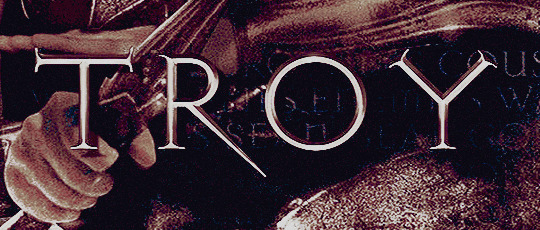
𝐓𝐑𝐎𝐘 (𝟐𝟎𝟎𝟒) 𝐐𝐔𝐎𝐓𝐄𝐒 𝐒𝐄𝐍𝐓𝐄𝐍𝐂𝐄𝐒. all quotes and sentences were taken from the movie troy (2004). change locations, names and pronouns as you see fit. mentions of war and politics are included in this post.
I'll tell you a secret. Something they don't teach you in your temple. The Gods envy us. They envy us because we're mortal, because any moment might be our last.
Everything is more beautiful because we're doomed. You will never be lovelier than you are now.
If they ever tell my story let them say that I walked with giants.
Men rise and fall like the winter wheat, but these names will never die.
Let them say I lived in the time of Hector, tamer of horses. Let them say I lived in the time of Achilles.
You gave me peace in a lifetime of war.
You're still my enemy in the morning.
You're still my enemy tonight. But even enemies can show respect.
I have endured what no one on earth has endured before. I kissed the hands of the man who killed my son.
I know my country better than the Greeks, I think.
You are a brave man. I could have your head on a spit in the blink of an eye.
Do you really think death frightens me now? I watched my eldest son die, watched you drag his body behind your chariot.
Give him back to me. He deserves a proper burial, you know that. Give him to me.
How many cousins have you killed? How many sons and fathers and brothers and husbands? How many, brave Achilles?
I knew your father, he died before his time. But he was lucky not to live long enough to see his son fall.
War is young men dying and old men talking. You know this. Ignore the politics.
My brothers of the sword! I would rather fight beside you than any army of thousands! Let no man forget how menacing we are.
Do you know what's waiting beyond that beach? Immortality! Take it! It's yours!
I chose nothing. I was born and this is what I am.
Imagine a king who fights his own battles. Wouldn't that be a sight?
Of all the warlords loved by the gods, I hate him the most.
Will strangers hear our names long after we are gone, and wonder who we were, how bravely we fought, how fiercely we loved?
Men are haunted by the vastness of eternity.
You say you're willing to die for love but you know nothing about dying and you know nothing about love!
Go home, prince. Drink some wine, make love to your wife. Tomorrow, we'll have our war.
Perhaps your brother can comfort them. I hear he's good at charming other men's wives.
You speak of war as if it's a game.
But how many wives wait at Troy's gates for husbands they'll never see again?
If you go to Troy, glory will be yours.
And the world will remember your name. But if you go to Troy, you will never come back... for your glory walks hand-in-hand with your doom. And I shall never see you again.
They say your mother was an immortal godess. They say you can't be killed.
You have your swords. I have my tricks. We play with the toys the gods give us.
All my life I've lived by a code and the code is simple: honor the gods, love your woman and defend your country.
Troy is mother to us all. Fight for her!
There are no pacts between lions and men.
Aren't you afraid?
Everyone dies, whether today or fifty years from now.
If I don't, you'll kill more men.
At night I see their faces. All the men I've killed. They're standing there on the far bank of the river Styx. They're waiting for me. They say, 'Welcome, brother'.
Last time you spoke to me like this, you were 10 years old and you'd just stolen Father's horse. What have you done now?
Do you love me, brother? Will you protect me from any enemy?
Well, then your men did. The sun god will have his vengeance.
His priests are dead, and his acolyte's a captive. i think your god is afraid of me.
Afraid? Apollo is master of the sun, he fears nothing.
I know more about the gods than your priests. I've seen them.
You're royalty, aren't you? Spent years talking down to men.
You must be royalty. What's your name? Even the servants of Apollo have names.
What do you want here in Troy? You didn't come for the Spartan queen.
Why kill you now, Prince of Troy, with no-one here to see you fall?
You should not have come here tonight.
That's what you said last night?
Last night was a mistake.
I have made many mistakes this week.
Of all the kings of Greece, I respect you most. But in this war you're a servant. And I refuse to be a servant any longer.
Sometimes you need to serve in order to lead. I hope you understand that one day.
Prince Hector, is he as good a warrior as they say?
You come here uninvited. Go back to your ships and go home.
The sun was shining when your wife left you.
She's up there, watching, isn't she? Good. I want her to watch you die.
And I've seen the limits of your mercy and I tell you now, no son of Troy will ever submit to a foreign ruler.
Trojan soldiers died protecting you. Perhaps they deserve more than your pity.
Pearls from the sea of Propontus.
Am I still your captive?
I have heard rumors of your beauty. And for once, the gossip is right.
Soldiers of Troy! You men are warriors! To lead you has been my honor!
Hector fights for his country! Achilles fights only for himself!
You were brave to fight them. You have courage.
To fight back when I'm attacked? A dog has that kind of courage.
It's no insult to say a dead man is dead.
I can't ask anyone to fight for me. I'm no longer queen of Sparta.
You're a princess of Troy now. And my brother needs you tonight.
Menelaus was a brave man. He fought for honor. And every day I was with him, I wanted to walk into the sea and drown.
I almost lost this war because of your little romance.
I want to see him grow tall. I want to see all the girls chasing after him.
Well, of course you do, she's a beautiful woman.
Then I'll make it easy for him to find me. I'll walk right up to him and tell him you're mine.
May the gods keep the wolves in the fields and the women in our beds.
150 notes
·
View notes
Text
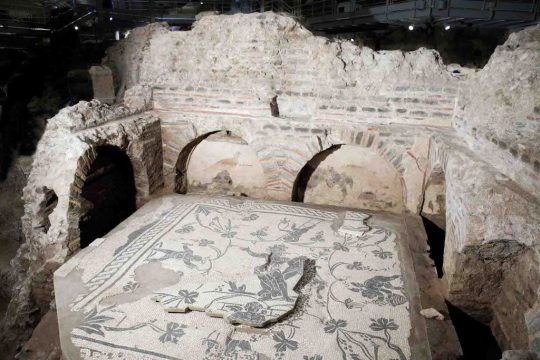
Vatican Museums Opens Ancient Roman Necropolis to the Public
The site was previously only accessible to scholars and specialists.
The Vatican Museums has newly opened to the public an ancient necropolis stocked with carved marble sarcophagi and bone-filled open graves of everyday ancient Romans.
The word necropolis comes from the Greek expression for “city of the dead.” These “cities” grew up alongside roads outside the urban center due to laws forbidding cremation and burial of the dead inside city limits. Funerary practices and rites are preserved especially clearly in the necropolis that extends along the Via Triumphalis (a Roman road now known as the Via Trionfale), with burial sites accompanied by eye-popping Roman frescoes and mosaics.
Previously, the necropolis was accessible only to certain groups of scholars and specialists. It is now open to the public via the new Saint Rose Gate entrance, inaugurated with the exhibition “Life and Death in the Rome of the Caesars.”
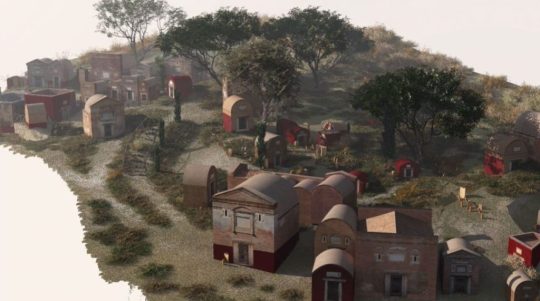
How extensive is the archaeological area?
It extends nearly 11,000 square feet. The size of the necropolis is not as extensive as some other Roman burial sites, but its importance lies in its proximity to one of the most significant religious sites in Christianity.
What is known about particular people who are buried there?
According to archaeologists, no less than the tomb of St. Peter himself is located in the Vatican Necropolis.
But in general, “Here, we have represented the lower middle class of Rome’s population,” said Leonardo Di Blasi, an archaeologist with the Vatican Museums, in a video on Euro News. ���They are essentially slaves, freedmen, artisans of the city of Rome.” Some were the property of the emperor, and are indicated to have been the “servant of Nero.”
One of them was a man named Alcimus, who was the set director for the downtown Theater of Pompeii, the most important theater of the period. Another was a horse trainer who worked at the chariot races.
One young boy is interred there, according to the Catholic News Service, marked by a sculpture of a boy’s head accompanied by an inscription reading “Vixit Anni IIII Menses IIII Dies X,” Latin for “He lived four years, four months, and 10 days.”
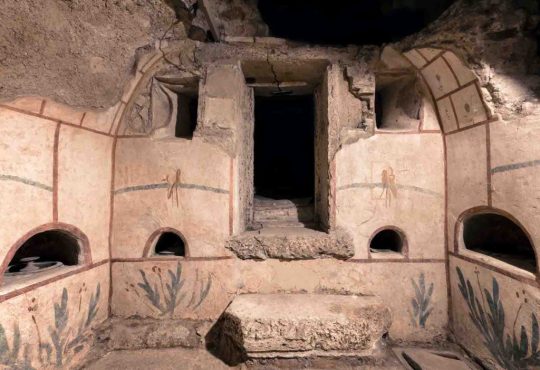
How did this ancient burial ground come to light?
The Vatican burial grounds were first explored in the 1940s at the request of then Pope Pius X, who wanted to be buried near the grave of Peter the Apostle. The dig revealed numerous mausoleums and tombs.
The newest part of the burial ground was revealed through an infrastructure project in 2003, as the Vatican excavated for a new multilevel employee parking garage.
What happened when the Vatican discovered these newest burial grounds?
The department of the Vatican that was overseeing construction of the parking garage, intent on meeting its deadline, was accused of trying to conceal the find, Giandomenico Spinola, an archaeologist and deputy artistic-scientific director of the museums, told the Catholic News Service. It was only when journalists publicized the discovery that he and his colleagues were invited in to advise.
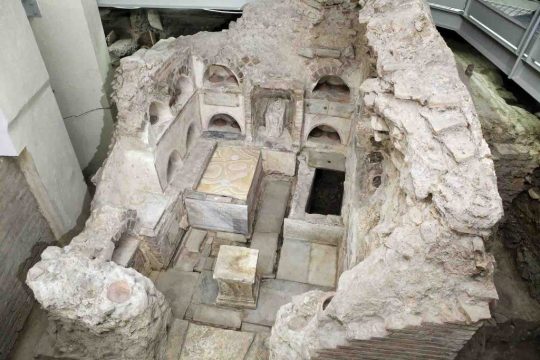

When were the bodies there buried? How have the tombs been so well preserved?
Bodies were interred in this burial ground between the first century B.C.E and the fourth century C.E., and organic remains have vanished. A number of the graves, including their tombs and decorations, including frescoes, mosaic floors, and marble-carved inscriptions, were fortuitously preserved by a series of mudslides in the area.
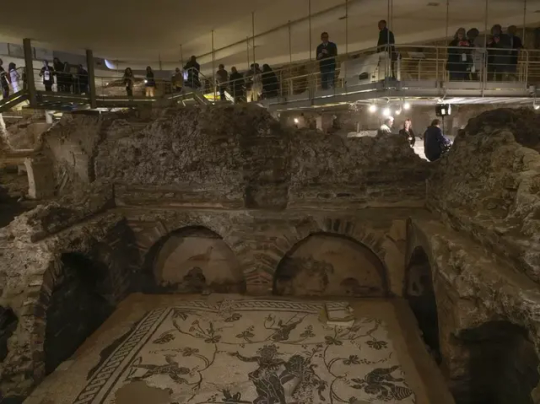
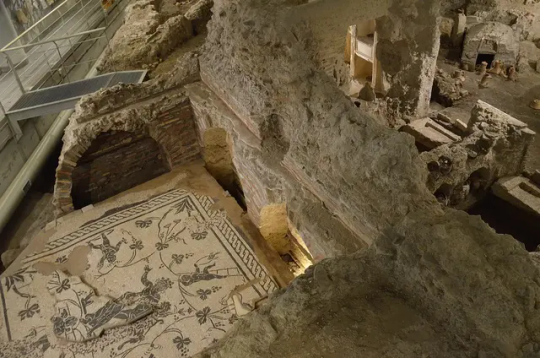
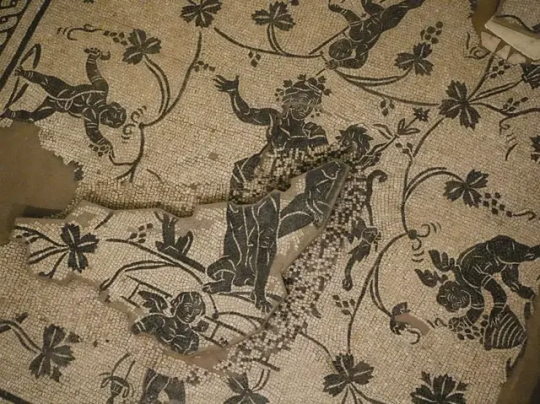
#Vatican Museums Opens Ancient Roman Necropolis to the Public#The Vatican Museums#Ancient Roman 'City for the Dead'#Via Triumphalis necropolis#Life and Death in the Rome of the Caesars#ancient graves#ancient tombs#ancient necropolis#ancient artifacts#archeology#archeolgst#history#history news#ancient history#ancient culture#ancient civilizations#ancient rome#roman history#roman empire#roman art
268 notes
·
View notes
Text

A pair of gold earrings discovered as part of a chariot burial near Sainte-Colombe-sur-Seine, France, circa 6th century BC
from The National Museum of Archaeology, France
317 notes
·
View notes
Text
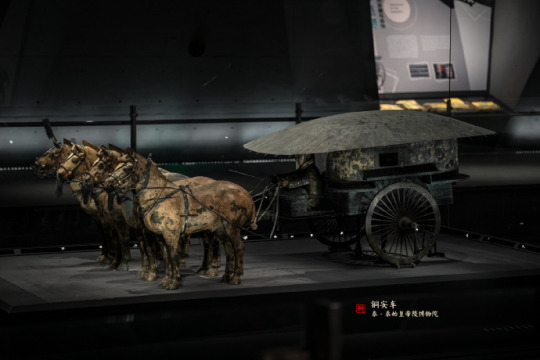
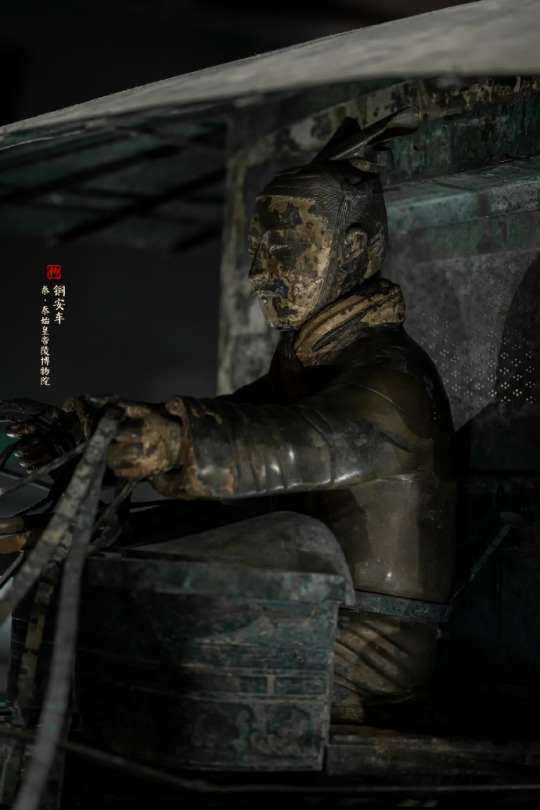
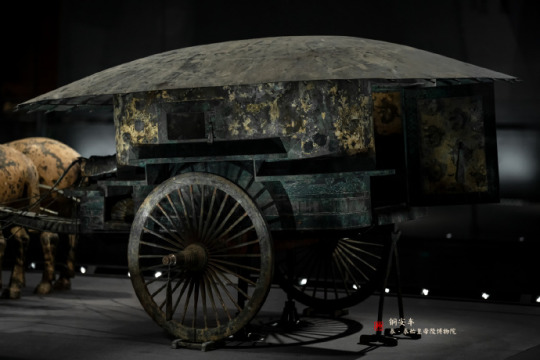



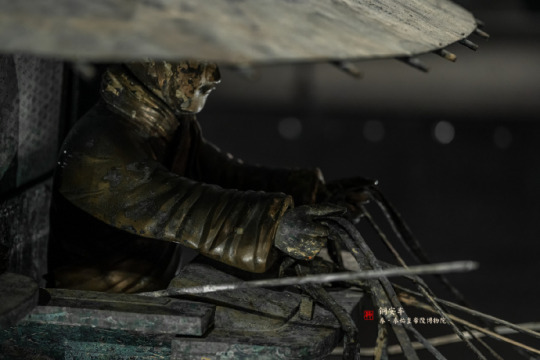
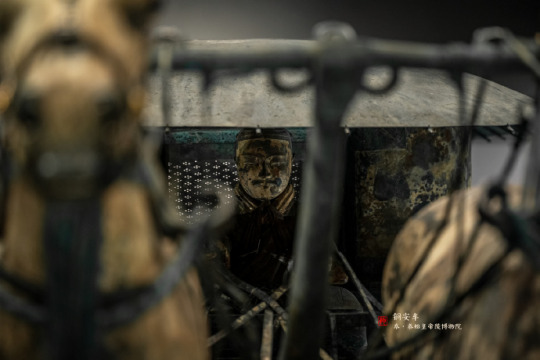

Canopy Chariot From The Emperor Qinshihuang Mausoleum
Qin dynasty chariot, unearthed from the burial pit on the west side of the Qinshihuang Mausoleum (秦始皇陵) in Lintong, Shaanxi.
The life-size painted chariot is 317 cm long and 106.2 cm high. Exhibited in the Emperor Qinshihuang's Mausoleum Site Museum (秦世皇黃陵博物院).
Vintage photos of the excavation and restoration:

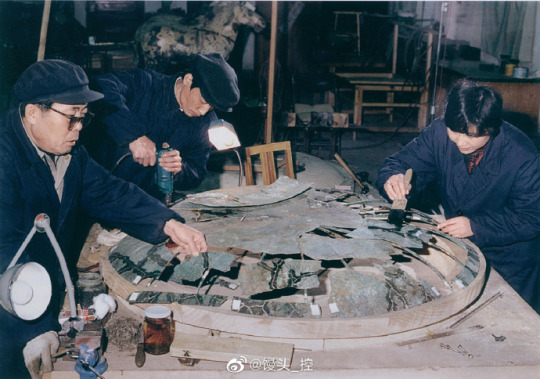
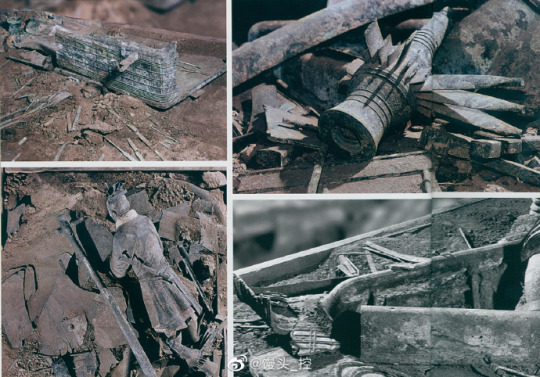
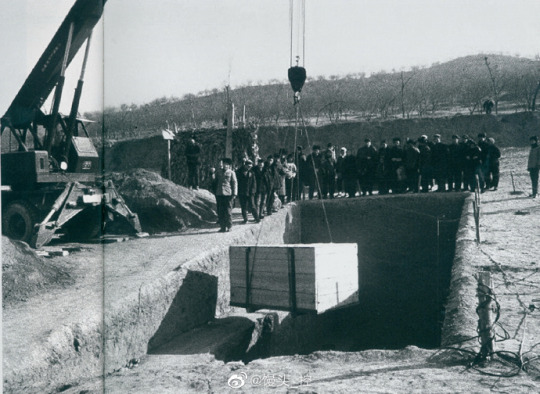

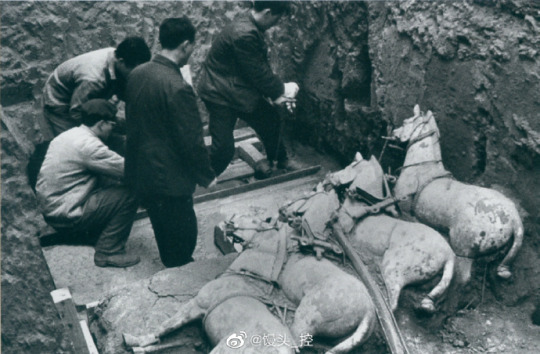
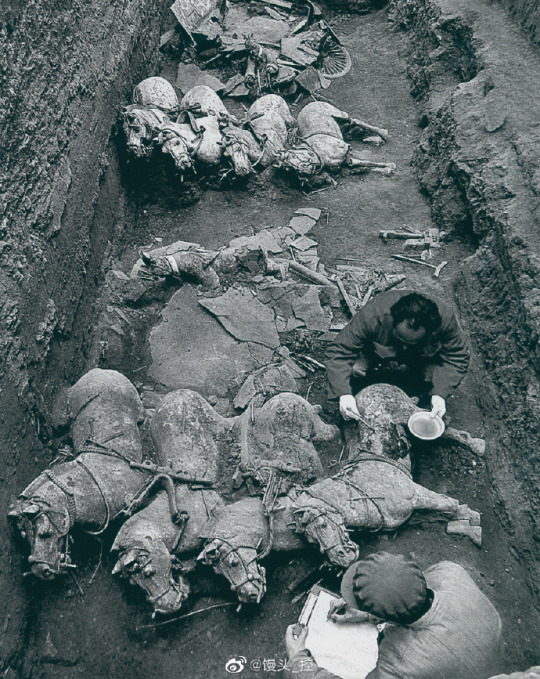
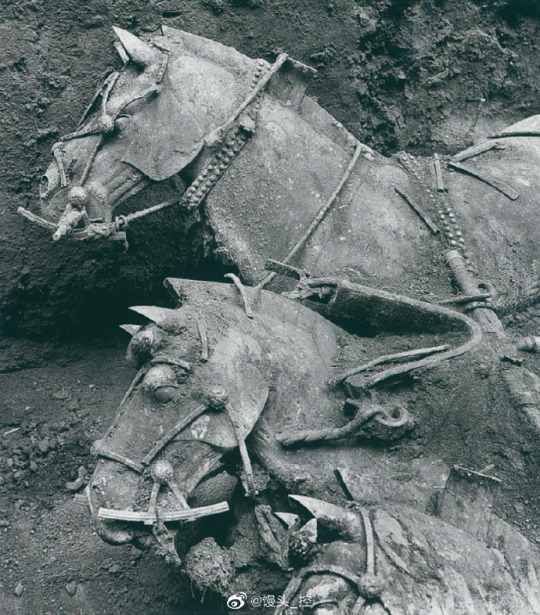
#ancient china#chinese culture#chinese art#chinese history#qin shi huang#chariot#qin dynasty#ancient tomb#archeology#chinese warfare#Terracotta Army#terracotta#mausoleum#tomb art#charioteer
69 notes
·
View notes
Text
hi im forcing you to listen to my HSR x MDZS AU.
this AU features a hot new xianzhou ship: the Xianzhou Wulin (武林; wǔlín; 'martial forest'; related to the term jianghu). this is where the AU versions of the cultivation world and the five sects reside. i will be rambling about this ship in an upcoming post :3 yippie
im putting the timeline of this AU in the Finest Duel Under the Pristine Blue Trailblaze Continuance so lots of spoilers for the storyline up to version 2.5
AU includes:
insane 'pass the arbiter-general title' game between the jins, wens and the nies. currently jin guangyao is the arbiter-general AND master diviner while a wounded nie mingjue holds the cloud knights general title still after narrowly escaping an assassination attempt. the wulin has two factions that are currently butting heads much to everyone's chagrin: jgy's supporters, and nmj's supporters.
nmj is the rightful owner of the title arbiter-general since he holds the spiritus baxia, the Indomitable Sword, which means he has Lan's approval.
lxc as the vidyadhara high elder who is torn between his two sworn brothers, and his duty of upkeeping the ancient forest that suppresses their ship's plaguemark aka the burial mounds
vidyadhara!lwj as the realm-keeping commissioner who still mourns the loss of wwx who was lost to the stars during the last wulin civil war
foxian!wwx who was thrown into the burial mounds and came out a mutated foxian with several tails and the ability to control the mara-struck. after he outlives his usefulness, jin guangshan and the other previous generation six charioteers secretly arrange to have him be thrown to a shadow of IX
he survives and emerges as a self-annihilator and emanator of nihility. he roamed the universe for a bit until he got picked up by none other than jing yuan himself.
wwx becomes jing yuan's "blade in the dark" a la moze to feixiao. no one knows of wwx's survival and subsequent adoption into the luofu. wwx is also letting himself be used as a source for mara-related research on the luofu
wangxian are each other's first loves ofc but sometimes wwx looks appreciatingly at jing yuan. they have a weird unresolved secret third thing tension and it makes yanqing want to run away and gag bc stop making googly eyes at my father figure tf
WANGXIAN WILL REUNITE DURING THE WARDANCE TRUST because wwx will be brought out to help deal w hoolay <3 and lwj is there accompanying the wulin's representatives for the wardance, and ofc he goes and helps w the current borisin crisis
more to come in the future yay
#mdzs#mo dao zu shi#grandmaster of demonic cultivation#wei wuxian#wei ying#lan wangji#lan zhan#wangxian#hsr#honkai star rail#hsr 2.5 spoilers#mine : the xianzhou wulin au
14 notes
·
View notes
Text

Anatolian, late 4th-3rd millennium BCE
Bulls with a silver triangle between their horns have been found in central Anatolian royal burials. The collar and holes for a nose ring suggest that the animal may have been harnessed to a god's chariot.
20 notes
·
View notes
Text
OC Interview
Thank you for the tags @mk-writes-stuff and @kaylinalexanderbooks!
For this one I am going to be using two characters that are both from The Testaments of the Green Sea, but from different cycles. Akard is from the Ninma Cycle, Batricca is from the Mikrab Cycle. Both of these interviews will take place before their first introduction in their respective cycles, gotta avoid those spoilers.
Are you named after anyone?
Akard: "Named after anyone? Well I suppose all nobility are aren't they? As for a specific person...no, or if there was such a person, my father never told me about them."
Batricca: "My grandfather, may he rot, gave me the name of my mother."
When was the last time you cried?
Akard: "Cried...well I would rather not say, if that's alright with you."
Batricca: "370 years ago. I was a fool then, crying over a liar and a coward."
Do you have kids?
Akard: "Kids? I don't have time for that, not yet at least, some day, maybe."
Batricca: " I forget....somewhere around 165, I think."
Do you use sarcasm a lot?
Akard: "Of course I do, sarcasm is the third language of the Apunian court. The other two? Apunian and Lies."
Batricca: "Sarcasm is the art of those without the power or respect to talk seriously."
What’s the first thing you notice about people?
Akard: "Not to sound...vain, but their clothes. You can tell much about a person just by looking at their clothes. Where they came from, their tastes, their status..."
Batricca: "Their posture. How do they hold themself before me? How do they act in the face of the War Queen?"
What’s your eye colour?
Akard: "Brown, like acacia wood. That's what my nursemaid used to say."
Batricca: "Blue, like the cloudless sky."
Scary movies or happy endings?
Akard: "Hmm...I'm assuming a movie is some sort of story and song. When you say happy, does that include just stories? I like stories in which the wicked are punished and the righteous are elevated.
Batricca: "Hahahaha! I do love scary stories, because they are always about me, well at least the best ones."
Any special talents?
Akard: "I like to think that I am quite good on a chariot. I can paint, I'm not a terrible lyre player..."
Batricca: "Talents? I have many. Too many to name. I can pull apart a wall with my hands, I can pull a sturgeon from the river with no hook, I can bend swords with my teeth. Are those talent enough for you?"
Where were you born?
Akard: "Apuna, in the city of Nashawey, if my father is to be believed, it was in the Fapacha's stable."
Batricca: "The City of the Sinutrax tribe, in the burial mound of my great grandfather, where my grandfather left my mother to birth me...and to die."
Do you have any pets?
Akard: "I had a hound, and two cats. But I gave them into the care of one of the other members of the Fapacha's court. They don't do well at sea. Their names were Tumel, Senaha, and Hiruru."
Batricca: " Do the 17 tribes count?"
What sort of sports do you play?
Akard: "I used to wrestle, I did some chariot racing, some foot racing too, and I did my fair share of bird hunting."
Batricca: "My sport is war."
How tall are you?
Akard: "Something like...five feet and seven inches? Tall for the Apunian court."
Batricca: "Eight feet and five inches, at my last count."
What was your favourite subject in school?
Akard: "I enjoyed learning history, even if Kishetal was only an afterthought in the minds of my Apunian tutors."
Batricca: "School? Do I look like an olive-sucking southerner to you?"
What is your dream job?
Akard: "Oh that's easy, following in my father's and my grandfather's footsteps."
Batricca: " Where I am now, while....more is always better."
Tagging @illarian-rambling , @roach-pizza , @willtheweaver , @vyuntspakhkite-l-darling , and @revenantlore
13 notes
·
View notes
Text

Sun cross, also called solar cross, sun wheel, is one of oldest symbols, dating back to prehistoric cultures. It has been found around the world and holds different interpretations to various cultures. It is believed to be one of oldest religious symbol in world, with links to Indian, Asian, American and European religious art from prehistoric ages.
The symbol, and its many variations, have been found around the world. Carvings from the Bronze Age show the solar cross depicted on burial urns, dating back to 1440 BC. It makes appearances on ancient cave walls, in places of worship, on coins, artwork, sculptures and in architecture.
Most basic form of sun cross features an equilateral cross set within a circle. This variation is known as Odin’s cross in Norse culture. It represented Odin, the most powerful of Nordic gods. Interestingly, English word cross is derived from Norse word for this symbol – kros.
Celtic pagan god of thunder, Taranis, was often depicted with a spoked wheel in his hand, often associated with the solar cross. This wheel has been found on Celtic coins and jewelry. The Celtic cross is believed to be a variation of the wheel of Taranis, with the circle in its center believed to represent the sun.
Swastika is a variation of the solar cross, featuring bent arms in a turning motion. This symbol was considered a good luck charm and used around the globe by many cultures, including the Native Americans, until Hitler appropriated it and altered its positive symbolism forever.
It’s a symbol of sun, an object that has been worshipped since ancient times. Belief was that symbol represented chariot wheel of Sun god. Ancient kings in Egypt and elsewhere used this symbol as they saw it as representing highest power – sun. It represents wheel, which gave power, strength and mobility to people and society. In modern astronomy, the solar cross is used as the symbol for the Earth, rather than the sun.
In Christianity, sun cross represents a halo, which is associated with angels and saints. Christians also consider it a symbol of the power of God. --Archaeo - Histories
@ archeohistories

11 notes
·
View notes
Text


















Enter if you Dare: Mistake Entries!
~
@big-golyat — Slayer of the Meek
@bowtochris — Sun God's Chariot
@corporalotherbear — Counterstrike
@curiooftheheart — Drop the Bass
@feyd-rautha-apologist — Curse of Heeded Summons
@helloijustreadyourpost — Boros Bomb Squad
@hypexion — Archive Overflow
@izzet-always-r-versus-u — Grab and Smash
@masternexeon — Lil' Butterfingers
@misterstingyjack — Butterfingers
@nine-effing-hells — Oeuvre Bonfire
@real-aspen-hours — Suspicious Deal
@reaperfromtheabyss — Collateral Seizer
@stupidstupidratcreatures — Bright Idea
@tanknspank — Beloathed Burial Grounds
@the-gboi — Cartographer's Blunder
@wildcardgamez — Skybridge Bouncer
@zenonxi — Curse of Remorse
Thank you all for your entries!
7 notes
·
View notes
Text
In Ancient Greece, a proper burial was very important to the people. It was such an important ritual in thier beliefs that denying one was considered striping someone of thier dignity. In Iliad when Achilles kills Hector in duel, as a ravange for the death of Patroclus, he refuse to return his body to his family. He drags the lifeless body od Hector behind his Chariot, and throws him to dogs and vultures (so his soul will definitely be damned to walk the earth for the rest of eternity). The gods themselves, disturbed by this prevents this, and via Achilles mother convince him to return the killed Prince for a proper burial. Priam, the king himself go to get his son's body, granted a safe journey by the gods. After Hectors cremation and burial Troy enters a mourning period that is said that even Greeks respected and didn't attacked the city. Even Helen mourns him. We can learn about the importantce of the burial from other myths and stories as well. One of tricks to cheat death that King Sisyphus uses is to ask his wife to not bury him. This way he tells Charon that his wife didn't buried him, so he have no way to pay for the journey through Styx (as the dead were be supposed to be buried with coins for this exact reason) and ask him if he can come back to Earth and beg for proper burial. In Antigone, a greek play depicting events that are part of Theban Myths, the titular characters looses two brothers in a civil war for the throne of Thebes. One of them is denied a respectable burial, she, knowing how terrible of a fate it is, rebels again it and try to get him one. Loosing her life in the process (she killed herself after new king ordered to bury her alive for doing so). We know that the rivereside of Styx is full of ghosts, dead soldiers who never got to be cremated nor buried, and had no way to pay Charon to cross the river.
That being said Polites didn't had one. And Odysseus will be sailing past the Underworld at some point. Which is interesting bc in the Odyssey the main characters he got to see there were (not counting his mother and Tiresias) the fallen warriors who fought in Trojan War as Polites is still alive at this point of the story. Makes me wonder about things.
98 notes
·
View notes
Text
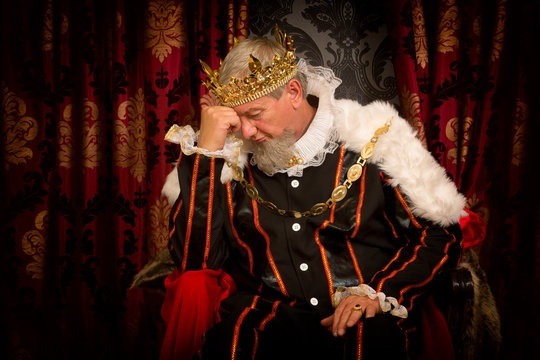
Judgment Against Wicked Kings
1 This is what the Lord says: “Go down to the palace of the king of Judah and proclaim this message there: 2 ‘Hear the word of the Lord to you, king of Judah, you who sit on David’s throne—you, your officials and your people who come through these gates. 3 This is what the Lord says: Do what is just and right. Rescue from the hand of the oppressor the one who has been robbed. Do no wrong or violence to the foreigner, the fatherless or the widow, and do not shed innocent blood in this place. 4 For if you are careful to carry out these commands, then kings who sit on David’s throne will come through the gates of this palace, riding in chariots and on horses, accompanied by their officials and their people. 5 But if you do not obey these commands, declares the Lord, I swear by myself that this palace will become a ruin.’”
6 For this is what the Lord says about the palace of the king of Judah:
“Though you are like Gilead to me,
like the summit of Lebanon,
I will surely make you like a wasteland,
like towns not inhabited.
7 I will send destroyers against you,
each man with his weapons,
and they will cut up your fine cedar beams
and throw them into the fire.
8 “People from many nations will pass by this city and will ask one another, ‘Why has the Lord done such a thing to this great city?’ 9 And the answer will be: ‘Because they have forsaken the covenant of the Lord their God and have worshiped and served other gods.’”
10 Do not weep for the dead king or mourn his loss;
rather, weep bitterly for him who is exiled,
because he will never return
nor see his native land again.
11 For this is what the Lord says about Shallum son of Josiah, who succeeded his father as king of Judah but has gone from this place: “He will never return. 12 He will die in the place where they have led him captive; he will not see this land again.”
13 “Woe to him who builds his palace by unrighteousness,
his upper rooms by injustice,
making his own people work for nothing,
not paying them for their labor.
14 He says, ‘I will build myself a great palace
with spacious upper rooms.’
So he makes large windows in it,
panels it with cedar
and decorates it in red.
15 “Does it make you a king
to have more and more cedar?
Did not your father have food and drink?
He did what was right and just,
so all went well with him.
16 He defended the cause of the poor and needy,
and so all went well.
Is that not what it means to know me?”
declares the Lord.
17 “But your eyes and your heart
are set only on dishonest gain,
on shedding innocent blood
and on oppression and extortion.”
18 Therefore this is what the Lord says about Jehoiakim son of Josiah king of Judah:
“They will not mourn for him:
‘Alas, my brother! Alas, my sister!’
They will not mourn for him:
‘Alas, my master! Alas, his splendor!’
19 He will have the burial of a donkey—
dragged away and thrown
outside the gates of Jerusalem.”
20 “Go up to Lebanon and cry out,
let your voice be heard in Bashan,
cry out from Abarim,
for all your allies are crushed.
21 I warned you when you felt secure,
but you said, ‘I will not listen!’
This has been your way from your youth;
you have not obeyed me.
22 The wind will drive all your shepherds away,
and your allies will go into exile.
Then you will be ashamed and disgraced
because of all your wickedness.
23 You who live in ‘Lebanon,’
who are nestled in cedar buildings,
how you will groan when pangs come upon you,
pain like that of a woman in labor!
24 “As surely as I live,” declares the Lord, “even if you, Jehoiachin son of Jehoiakim king of Judah, were a signet ring on my right hand, I would still pull you off. 25 I will deliver you into the hands of those who want to kill you, those you fear—Nebuchadnezzar king of Babylon and the Babylonians. 26 I will hurl you and the mother who gave you birth into another country, where neither of you was born, and there you both will die. 27 You will never come back to the land you long to return to.”
28 Is this man Jehoiachin a despised, broken pot,
an object no one wants?
Why will he and his children be hurled out,
cast into a land they do not know?
29 O land, land, land,
hear the word of the Lord!
30 This is what the Lord says:
“Record this man as if childless,
a man who will not prosper in his lifetime,
for none of his offspring will prosper,
none will sit on the throne of David
or rule anymore in Judah.”
— Jeremiah 22 | New International Version (NIV)
Holy Bible, New International Version®, NIV® Copyright ©1973, 1978, 1984, 2011 by Biblica, Inc.® All rights reserved worldwide.
Cross References: Genesis 37:25; Numbers 27:12; Deuteronomy 4:26; Deuteronomy 29:24; 2 Samuel 7:2; 1 Kings 9:8; 1 Kings 13:30; 1 Kings 21:23-24; 2 Kings 23:25; 2 Kings 23:30; 2 Kings 23:34; 2 Kings 24:6; 2 Kings 24:8; 2 Kings 24:15-16; 1 Chronicles 28:9; 2 Chronicles 21:20; 2 Chronicles 35:25; Psalm 129:1; Isaiah 10:3; Isaiah 65:13; Jeremiah 4:31; Jeremiah 17:25; Jeremiah 21:14; Jeremiah 22:26; Matthew 1:12; Matthew 23:23; Matthew 23:38; Luke 1:32; Luke 12:15; James 5:4
#warning#judgment#kings of Judah#palaces#Shallum#Jehoiakim#Coniah#Jeremiah 22#Book of Jeremiah#Old Testament#NIV#New International Version Bible#Biblica Inc.
7 notes
·
View notes
Text

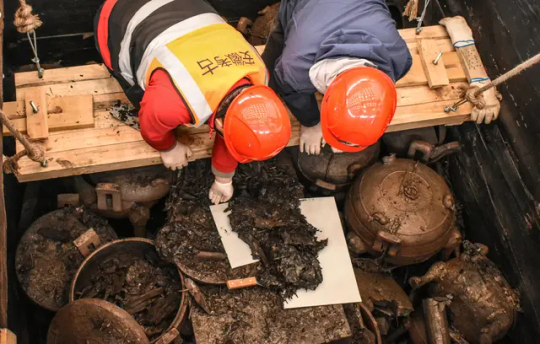
Lavish 2,200-year-old King Tomb Discovered in China
Archaeologists have unearthed a luxurious 2,200-year-old tomb in eastern China, the largest, highest-ranking, and most structurally complex ever unearthed, which may have belonged to an emperor of the state of Chu during a critical period in Chinese history.
Chu was one of the seven Warring States, along with Qin, Han, Wei, Zhao, Qi, and Yan. The unification of these states is recognized as the start of modern China.
The 2,200-year-old Wuwangdun tomb, which is situated in the Anhui Province of East China’s city of Huainan, has yielded over 1,000 artifacts, including figurines, musical instruments, bronze goods, and everyday utensils and lacquerware artifacts, dating to about 220 BC.
At Wuwangdun, one of the largest-scale Chu state archaeological sites, researchers previously uncovered a cemetery spanning 1.5sqkm, with a chariot and sacrifice pits and a tomb, believed to be that of the cemetery’s owner.
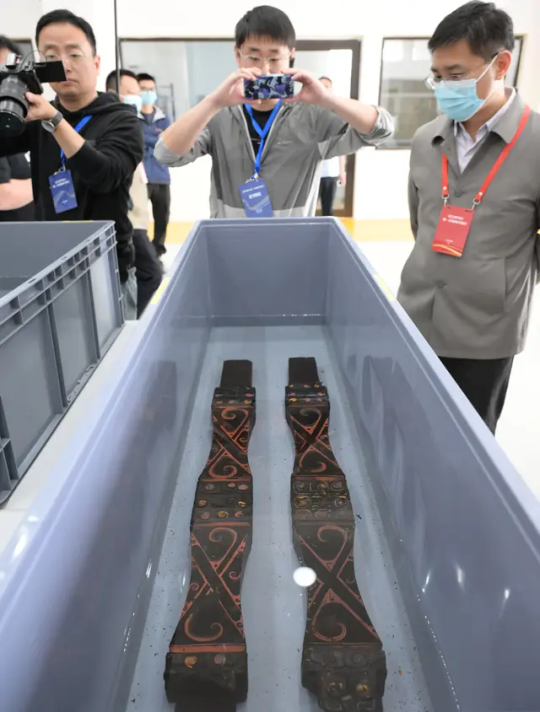



The tomb is thought to be the highest-level ancient Chu state tomb ever excavated, and its vast scale, intricate structure, and rich contents suggest it belonged to the state’s emperor.
According to information obtained by the Global Times newspaper from the Institute of Cultural Relics and Archaeology of Anhui Province, based on the size and scale of the tomb, as well as historical records, it is estimated that the owner of the tomb may be King Kaolie of Chu. However, a more accurate determination of the tomb’s occupant will require further extraction of artifacts and analyses of textual evidence.
Meanwhile, the tomb had been looted multiple times throughout history. Anhui was permitted by the NCHA in 2019 to excavate the tomb and salvage its archaeological remains. An official start to the excavation work was made a year later, and it was recognized as a national project to use archaeological research to determine the origins of Chinese civilization.
The Wuwangdun tomb complex, which covers an area of over 140 square kilometers, includes sacrificial pits, chariot and horse pits, accompanying graves, and the main burial chamber (Tomb No. 1). Tomb No. 1 is a large, nearly square, vertical pit tomb with sides that are about 50 meters long. There is a 42-meter-long, sloping tomb passage on the east side.
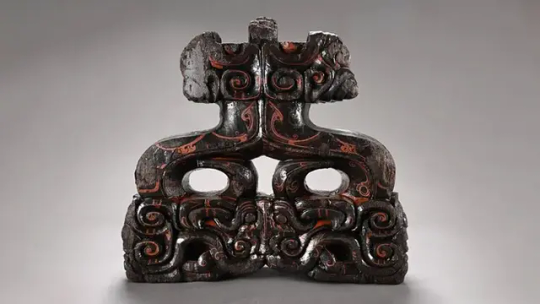


Around the pit, eight side chambers were found, and a central coffin chamber with several layers of planks covering it was also found. 443 coffin lid planks and the 78 bamboo mats that covered them have been removed thus far. On the planks of the coffin lid, there were about 1,000 ink-drawn characters that represented the locations and purposes of each side chamber.
“The findings can provide an overall picture of the political, economic, cultural, technological and social conditions of the Chu state in the Warring States period,” Gong Xicheng, an archaeologist part of the excavation told Chinese state news agency Xinhua.
“The findings can help us learn about the historical evolution as well as the formation of a unified nation and its culture,” he added.
These discoveries provide systematic archaeological data for studying the high-level tomb system in the Chu state during the late Warring States period (475BC-221BC).
To discover while also preserving the unearthed remains archaeologists worked within a special low-oxygen laboratory built at the site.
By Leman Altuntaş.



#Lavish 2200-year-old King Tomb Discovered in China#Wuwangdun tomb#Huainan China#King Kaolie of Chu#ancient tomb#ancient grave#ancient artifacts#archeology#archeolgst#history#history news#ancient history#ancient culture#ancient civilizations#ancient china#chinese history#chinese emperor#chinese art
95 notes
·
View notes
Text
Excerpt From WS111, Treatise on Criminal Punishment
(Zhaocheng, Daowu, Mingyuan and Taiwu's attitude towards laws and law enforcement. Was paraphrased by Sima Guang in ZZTJ volume 122. Zhaocheng had a clear legal code, Daowu started out lenient but ended in lawlessness, Mingyuan relieved and cared for the people but had strict standards with the officials, and while Taiwu successfully revised the laws, his decree to have the people report illegal activities of the officials backfired spectacularly)
In Zhaocheng [1]'s second year of Jianguo [Establishing the Nation]: For those who died, allow their family to offer gold and horses to redeem; for those who committed the crime of great rebellion, male and female relatives regardless of young and old are all beheaded; male and female who do not use propriety in sexual relations [2] both die; for those people who kill one another, allow forty-nine horses and ox to be sent to help the deceased's family as burial items to pacify them; those who are not interrogated but implicated in arrest are tried; those who rob public items, [for each] one prepares five, private [items] prepares ten. The law was clear and the people were peaceful.
昭成建國二年:當死者,聽其家獻金馬以贖;犯大逆者,親族男女無少長皆斬;男女不以禮交皆死;民相殺者,聽與死家馬牛四十九頭,及送葬器物以平之;無繫訊連逮之坐;盜官物,一備五,私則備十。法令明白,百姓晏然。
Taizu [3] when young met difficulties [4], his preparation was dangerous and difficult, possessed understanding of the people's feelings and falsehoods. In his rule, his undertakings were benevolent and generous, and harmonised the common people. [When he] calmed Zhongshan [5], was troubled by the stern and confidential laws of previous generations, so ordered [one of] the Three Excellencies, Wang De, to remove the cruelties in their laws to the citizens, agreed in judging decrees to greatly honour simplicity.
太祖幼遭艱難,備嘗險阻,具知民之情偽。及在位,躬行仁厚,協和民庶。既定中原,患前代刑網峻密,乃命三公郎王德除其法之酷切於民者,約定科令,大崇簡易。
At this time, the people Under Heaven had long suffered the chaos of war, and feared the laws in peace. The emperor knew of the people's suffering in this way, thus pacified this with subtlety and silence, punishments would be lenient in sentencing, and the people were loaded with happiness.
是時,天下民久苦兵亂,畏法樂安。帝知其若此,乃鎮之以玄默,罰必從輕,兆庶欣戴焉。
Yet to the ministers did not let go in enforcing the laws. In the final years disaster was frequently seen, Taizu was not content [6], the law was dismissed and damaged, and punishments were very much excessively cruel because of this.
然於大臣持法不捨。季年災異屢見,太祖不豫,綱紀褫頓,刑罰頗為濫酷。
Taizong [7] ascended the throne, repaired abandoned offices, relieved the people's suffering, and ordered the Duke of Nanping, Zhangsun [8] Song and the Marquis of Beixin, An Tong, to correct and manage the disputes of the people, and common governance was again expressed. The emperor was proficient in the various affairs, and those who served as officials gradually because they were well versed in refined writings avoided errors [9].
太宗即位,修廢官,恤民隱,命南平公長孫嵩、北新侯安同對理民訟,庶政復有敍焉。帝既練精庶事,為吏者浸以深文避罪。
Shizu [10] ascended the throne, because he attached importance to laws in Shenjia [Divine Stag], decreed the Minister of Education, Cui Hao, to establish the laws. Removed five and four year sentences, added one year sentences. Divided the death penalty into two categories, death by beheading and hanging. Those who engaged in big rebellion with no morality would be chopped in half at the waist, their fellows executed and confiscated, those fourteen [11] and under castrated, women confiscated to the county officials [as servants]. Those who killed their relatives would be torn between chariots.
世祖即位,以刑禁重,神䴥中,詔司徒崔浩定律令。除五歲四歲刑,增一年刑。分大辟為二科死,斬死,入絞。大逆不道腰斬,誅其同籍,年十四已下腐刑,女子沒縣官。害其親者轘之.
For those who poisoned, their males and females were all executed, and their house burned. For those who engaged in witchcraft, would be submerged in deep water carrying a black ram and holding a dog in arms. For those serving punishment who would redeem [with money], the deficient would then whip them two hundred times. The weathy in the capital would manufacture charcoal in the mountains, and the poor would serve them in dirty rooms, women drafted to pound grain; they safeguarded rapidly and were not caught by others, watching over parks.
為蠱毒者,男女皆斬,而焚其家。巫蠱者,負羖羊抱犬沉諸淵。當刑者贖,貧則加鞭二百。畿內民富者燒炭於山,貧者役於圊溷,女子入舂槀;其固疾不逮于人,守苑囿。
Princes and officials of the nine ranks were able to change their official rank as punishment [by reducing it]. Women who were to be punished yet were pregnant would one hundred days after birth have be executed. For those fourteen and under, would degrade their punishment by half, for those eighty to ninety, unless they killed people would not be tried. Beating in interrogations could not exceed forty-nine strokes. For those who discussed punishment, the leader of the ministry would attest, the public vehicle would interrogate and inform, and the three would all decide.
王官階九品,得以官爵除刑。婦人當刑而孕,產後百日乃決。年十四已下,降刑之半,八十及九歲,非殺人不坐。拷訊不踰四十九。論刑者,部主具狀,公車鞫辭,而三都決之
For the dead, the category of the case would be presented and heard. If according to the death could not be reincarnated, and in threatening the supervising officials could not pacify, the prison would establish and in each case submit, the emperor would in person hear, if it amounted to words of complaint would be refused. For the executions in various provinces, would all first be decided and informed and then carried out. The left of watchtowers would suspend admonishment drums, if the people had an extreme injustice would beat the drum, and the public vehicle would present a memorial.
當死者,部案奏聞。以死不可復生,懼監官不能平,獄成皆呈,帝親臨問,無異辭怨言乃絕之。諸州國之大辟,皆先讞報乃施行。闕左懸登聞鼓,人有窮冤則撾鼓,公車上奏其表
After this the people and officials sought wealth, the emperor thought of putting this in order. In the third year of Taiyan [Great Extending], decreed the officials and people Under Heaven to obtain and report the illegal actions of ruling governors. Thereupon the common people would be vicious and contrary, monopolised and looked for the losses of ruling ministers, coerced those in rule, and seized the luxurious within the villages. Thus the chief officials all lowered their expectations in treating them, carelessly exempted so as to have no disgrace, and were greedy for violence yet still composed.
是後民官瀆貨,帝思有以肅之。太延三年,詔天下吏民,得舉告牧守之不法。於是凡庶之凶悖者,專求牧宰之失,迫脅在位,取豪於閭閻。而長吏咸降心以待之,苟免而不耻,貪暴猶自若也。
1 Tuoba Shiyijian, the final Prince of Dai before Dai's conquest by Former Qin, later honoured as Emperor Zhaocheng. The Weishu describes him as being a benevolent ruler, but he is mostly known for his relation to Tuoba Gui.
2. Could this refers to a woman having an affair outside of marriage, perhaps? I'm not sure what exactly this refers to.
3. Tuoba Gui, Emperor Daowu of Northern Wei. First emperor of the Northern Wei dynasty. Restored the fallen state of Dai, had great military prowess, a great administrator early in his reign, but became increasingly cruel and paranoid in his later years.
4. This refers to Tuoba Gui's early years. Dai fell when he was six years old, and he lived under the rule of Former Qin's Liu Kuren. In the chaos after Fei River, Liu Kuren was assassinated, and eventually his relative Liu Xian wanted to assassinate Tuoba Gui.
5. Refers to Tuoba Gui's campaigns against the Murongs of Later Yan, in which he seized much of Later Yan territory.
6. Refers to his growing cruelty and paranoia later in his reign, which his biography attributes to his taking of Cold Food Powder, a popular drugs amongst the elite of the era. More details are in Tuoba Gui's biography of the Weishu.
7. Tuoba Si, Emperor Mingyuan of Northern Wei. Though militarily weaker than his father or son, used a more relaxed and lenient style of governance to stabilise Northern Wei's position. However, he could be strict in his enforcement of laws with officials.
8. Should be Baba, as the Baba clan changed their clan name to Zhangsun under the reforms of Emperor Xiaowen.
9. The Zizhi Tongjian paraphrases this part as "季年疾病,刑法濫酷;太宗承之,吏文亦深" "[Taizu] in his later years was ill, and punishments were excessively cruel; Taizong succeeded him, and the officials in refined writings were also well-versed." In this case, 承之 should have a similar meaning to 承业.
10. Tuoba Dao, Emperor Taiwu of Northern Wei. Known for his reunification of the north, and also had great administrative abilities in addition to his military prowess. Unfortunately, his late reign was marred by cruelty and political intrigue, leading to his assassination.
11. By East Asian age reckoning, by Western age reckoning, it would be aged 13 and under.
3 notes
·
View notes